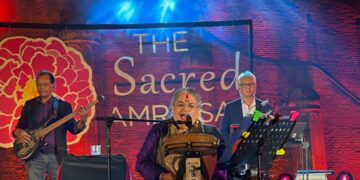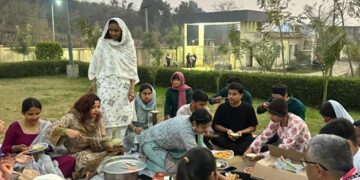In politics, defeats are often described as temporary setbacks. But some losses carry the weight of a verdict – a message so sharp that pretending not to hear it becomes a luxury that only the arrogant can afford. The recent bypoll debacle of the National Conference (NC) candidate is one such verdict. It did not merely signal disapproval; it revealed the deep disillusionment of a voter base that once stood by the party through storm, siege, and suffocation. This time, the voter walked away – quietly, firmly, and with unmistakable intent.
For decades, NC’s hold over Kashmir was built on two pillars: emotional ownership of the Valley’s political narrative, and the charisma of its leadership. But the decline of both has now converged into a breaking point. The bypoll result didn’t show a fractured support base – it showed a hollowed one. And at the center of this collapse stands a truth that NC refuses to confront: Omar Abdullah’s growing arrogance has alienated the very shoulders that once carried the party’s weight.
The Arrogance That Voters Now See Clearly
There was a time when Omar’s presence evoked hope among young Kashmiris – a sense that a new-generation leader would rise above the theatrical politics of old. But years of political distance, aloofness, and an unshakeable belief in the “inevitability” of NC’s dominance have eroded that image. The ordinary Kashmiri voter perceives him today not as a leader who listens, but as one who presumes loyalty.
This bypoll exposed that presumption brutally.
People who once canvassed tirelessly for NC stayed home. Those who once defended every shortcoming of the party chose silence. The rank-and-file – the shopkeeper who closed his shop early to attend NC rallies, the elderly Kashmiri who swore by the Sher-e-Kashmir legacy, the youth volunteer who wore the party flag like a badge of identity – they all stepped back. Not because they suddenly found alternatives charismatic, but because they felt unseen.
Omar’s political language has become increasingly dismissive–of rivals, of dissent within the party, and even of questions raised by supporters. The voter watches everything. And this arrogance has slowly turned into the party’s Achilles’ heel.
A Leadership Growing More Distant in a Valley Growing More Impatient
Post-2019 Kashmir is not the Kashmir Omar inherited. The political grammar has shifted. Voters now reward accessibility, grassroots presence, and problem-solving ability. They judge leaders not by their press conference sharpness but by their visibility in villages, localities, hospitals, funerals, and crisis spots.
This is where NC has decayed.
While emerging parties and independents reached streets and mohallas with humility and presence, Omar often appeared insulated – tweeting, commenting, reacting, but rarely engaging with the everyday frustrations of the people. The disconnect widened to the point where even NC’s most loyal voters began asking: “Where is the party that once claimed it was the guardian of our political aspirations?”
The bypoll defeat thus became less about the candidate and more about the leadership’s disappearance from lived realities. The alienation is emotional before it is political.
NC Still Talks Yesterday, While Voters Are Thinking Tomorrow
The Valley’s expectations have changed dramatically. Youth want jobs, stability, and dignity. Farmers want fair horticulture prices. Residents want reliable infrastructure and honest governance. Local businessmen want economic breathing space.
But NC’s narrative remains trapped in an outdated political nostalgia. It speaks the language of grievance at a time when voters are demanding governance. It makes emotional appeals when the electorate wants evidence of delivery. It relies on legacy when the political marketplace rewards performance.
This mismatch is not a flaw – it is a political crisis. And arrogance amplifies that crisis. Instead of introspection, NC often blames circumstances. Instead of engaging, it sermonizes. Instead of course correction, it defends the status quo.
The voter punished this attitude without raising their voice. The punishment was silent but surgical.
The Dedicated Voter Base Is No Longer Blindly Loyal
NC’s biggest strength was always the unwavering loyalty of its cadre and core supporters. That strength is now visibly weakening.
Why?
Because loyalty demands reciprocity.
When a voter feels ignored, dismissed, or taken for granted, their patience eventually breaks. And when a party projects an air of entitlement – as if votes are owed, not earned – the voter responds with withdrawal.
This bypoll result is not a minor fluctuation; it is a warning shot. The dedicated NC voter has not joined another party. They have simply stepped aside. They are signaling plainly:
“Don’t expect my vote if you cannot respect my voice.”
That is the political earthquake underneath the bypoll numbers.
Leadership Needs Renewal, Not Excuses
If NC is to recover, it must first acknowledge the truth: people are tired of leaders who appear unreachable. They are tired of tone-deaf messaging. They are tired of being made to feel like subjects rather than stakeholders.
And they are particularly tired of the arrogance that clouds Omar Abdullah’s public persona.
The Valley today is politically literate, emotionally aware, and sharply observant. It rewards humility and punishes hubris. This bypoll verdict is therefore not a defeat – it is a referendum.
A referendum on leadership. A referendum on arrogance. A referendum on the widening gulf between NC’s self-perception and the voter’s expectations.
In the end, the message from the ground is brutally simple: Kashmir will not follow leaders who believe they cannot fall. And Omar Abdullah has fallen not because others rose, but because he refused to bend.






